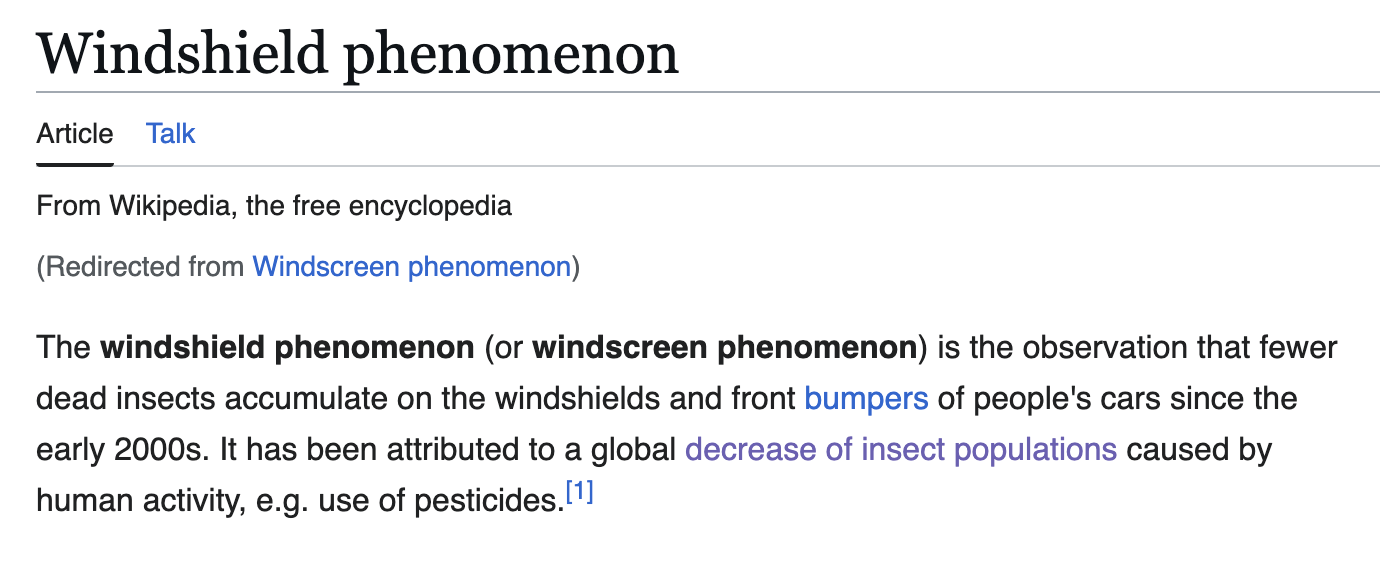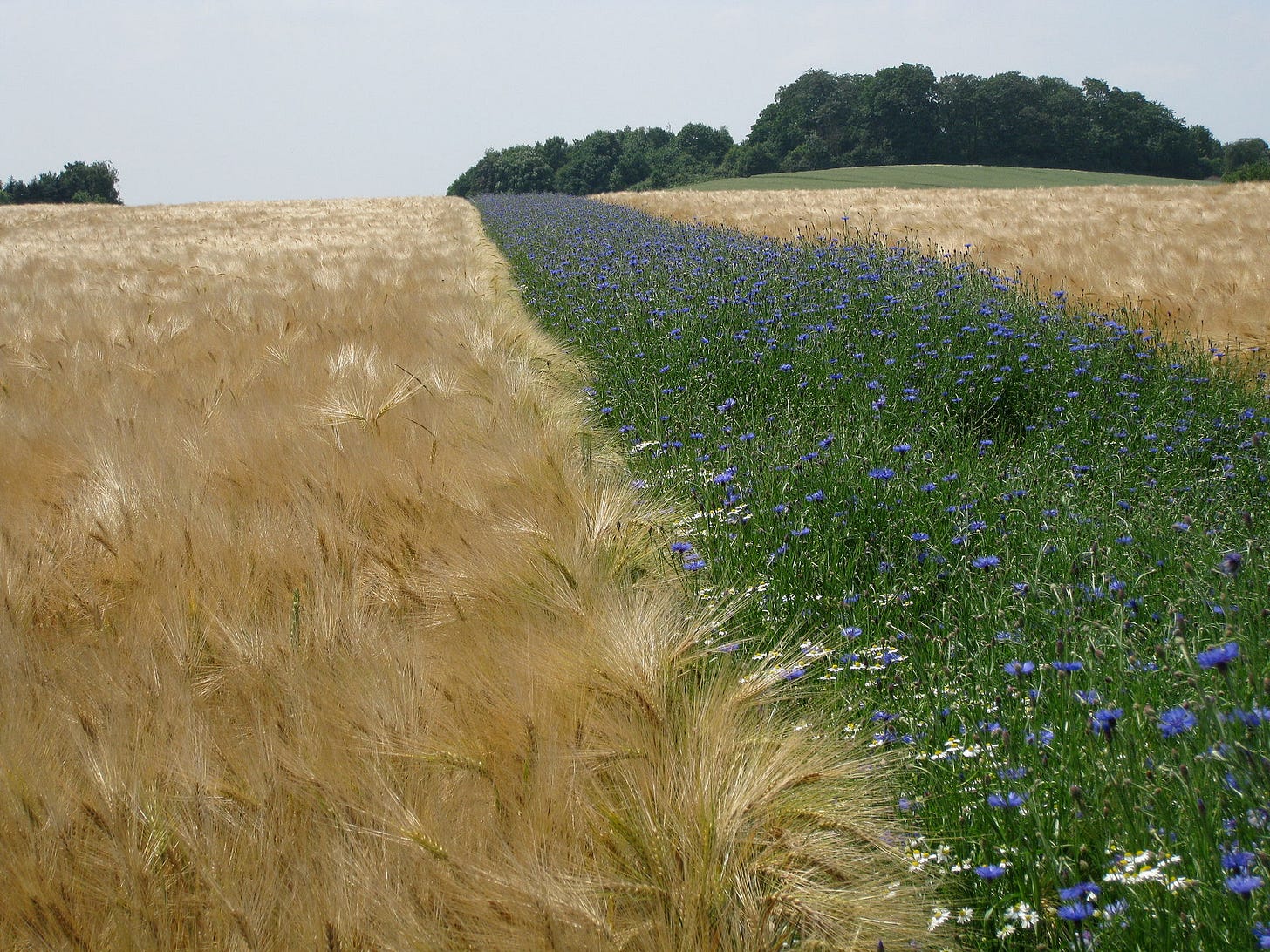The Great Debugging
I recall growing up, we would often take a 30min drive through countryside to visit my grandparents. It was a scenic trip, taking us through forest and fields, many of which were planted with wheat or rapeseed. As a child, it was also exciting — the countryside was full of animals, insects, and things to explore.
Insects were so plentiful that a single round trip would leave the car’s windshield and grille covered with them. One of my earliest earn-your-pocket-money gigs was then scrubbing all of them off afterwards. That and mowing the lawn of course.
I repeated this journey two weeks ago while visiting my family, driving the exact same route for old time’s sake. This time as the driver, not in the child seat.
Something was different though, the car returned from the trip dusty, but perfectly insect-free. I asked a few friendly locals and they’ve noticed it too.
There are significantly fewer insects than before. And that was just 25 years ago.
I had to learn more, it was time to debug. Pun intended.
Where have the bugs gone?
A quick Google search and here comes my first surprise: my observation has a name and a wikipedia page. It’s called the “windshield phenomenon”.

The observable decline in insect populations since the early 2000s has been studied across the world: Colorado’s insect biomass dropped by 47% in the last 35 years, while Germany experienced 75% drop in the last 27 years.
That’s a massive and rapid decrease!
The Zoological Society of London estimated that 20% of all invertebrate species were threatened with extinction.
I sometimes hear people say they wish some insects went extinct: who needs mosquitos anyway? All the do is spread diseases!
Let’s then break down why insects are in fact crucial to us.
Why you bugging me?
There are 900,000+ different types of insects. This makes it very difficult to generalize.
However, most insects are responsible for various Earth’s ecosystem roles.
They pollinate plants and flowers.
They help decompose bio matter.
They serve as food source to other species.
They help with soil fertility and seed dispersal.
Without bees Earth would turn into a desert.
Without ants the food chain would collapse.
Without beetles and ants, pest populations could spiral out of control.
Does the planet’s ecosystem need all of them equally? No.
Bedbugs, lice, even some species of mosquitoes could go extinct and have little impact on the environment and its food chain.
Vast majority of insect types do play a role, however, and the fact that they’re dying out is rather worrying. Without them, it turns into Mad Max’s world really quick.
In order to find out how we stop this Insect-geddon from happening, we must first understand what’s causing it.
How to fix the bug?
While this topic is rather understudied, most up to date academic understanding of the issue boils down to:
We take their home - monoculture agriculture, urbanization, deforestation
We poison them - widespread use of pesticides and insecticides kills them indiscriminately
We change the climate - disruption of insect lifecycles and ranges causes mismatches between plants and pollinators
We light up the sky - light pollution disrupts their reproduction and predator-prey dynamics
And these pressures have been building for quite some time. Modern agriculture took off in early 1900s, pesticides became widespread in the 1950s, insecticides (Neonicotinoids) in late 1980s and the effects of climate change became more noticeable in late 1990s.
Together, these factors can trigger a tipping point — a threshold beyond which ecosystem collapse becomes rapid and self-reinforcing.
So… we must do something about it. But what?
Such a multi-faceted problem requires a set solutions deployed in a number of industries:
Give their home back - promote agroforestry (integrating shrubs and trees into farms), protect and restore wild habitats (wildlands, meadows, forests) and practice regenerative farming
Stop poisoning - refrain from using harmful insecticides (especially neonics) and shift to targeted IPM (Integrated Pest Management)
Minimize climate change - reduce carbon footprints for the sake of humans and the 10 quintillion insects that we share this planet with
Reduce light pollution - Adopt dark sky policies in cities and suburbs, turn off unnecessary lights during peak insect seasons
Unless you’re a farmer or a city planner, you might feel helpless in this situation. But, it’s often the public awareness of a topic that drives narratives of change.
It’s the public awareness and pressure that influenced a few Insect-geddon achievements in the last few years:
Neonicotinoid getting banned in Europe in 2018 and Canada started phasing them out in 2016. ✅
Various insect-focused biodiversity programs launching worldwide, like the The Nature Conservancy program in the USA or German’s Action Programme for Insect Protection (Aktionsprogramm Insektenschutz). ✅
A growing number of farmers are now planting “wildflower strips” to restore insect habitat in commercial landscapes. ✅

Insects are in decline — but with awareness, action, and policy, that trend can still be reversed.
I really hope it does.
For the sake of all life on this planet.






Thanks for writing this! It needs drawing attention to, and this helps!